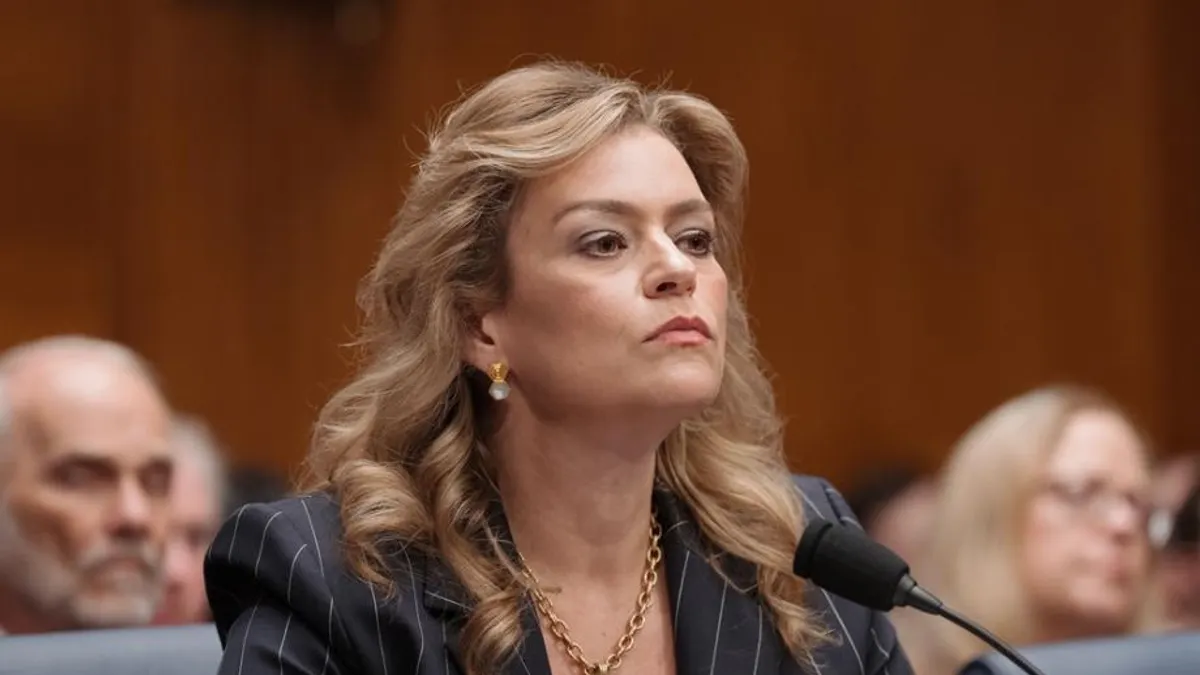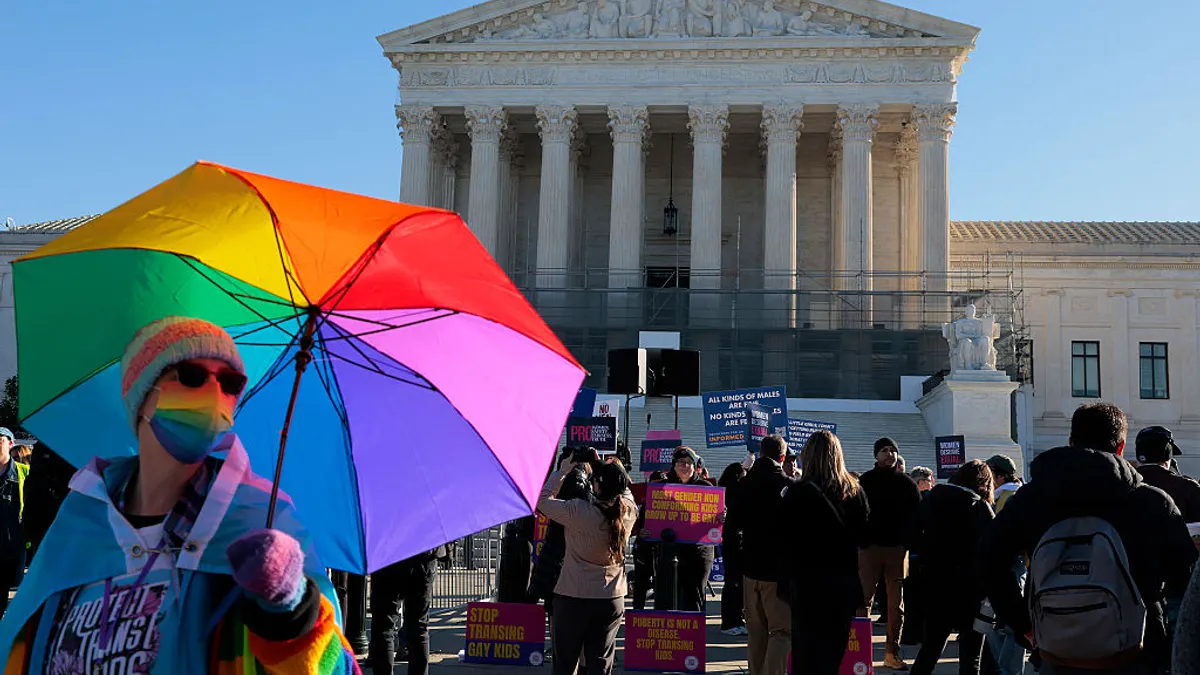After passing a series of continuing resolutions to get through December, Washington lawmakers are now considering a long-term resolution to get through the year, but may opt not to vote on a FY18 budget, Politico is reporting.
Republicans secured a major victory with the passing of the tax bill without the help of Democrats, but they need bipartisan support to pass a budget. And Democrats have been using that as leverage to advance their biggest policy agendas: permanent action on the Deferred Action for Childhood Arrivals program and funding for social programs.
Steven Bloom, director of government relations at the American Council on Education, served as counsel to the Senate Health, Education, Labor and Pensions Committee prior to his arrival at ACE. And while he cautions that he “can’t speak on behalf of Democrats” in Congress, he knows the same moral and economic grounds on which Democrats have supported the DREAM Act since the early 2000s are those driving higher ed’s support.
“We see [protecting these students] as both a moral imperative and a good thing to have on our campuses," Bloom said. "These bright young people” whom many in higher ed see as “incredibly meritorious students” because of what they’ve accomplished in spite of challenges they’ve faced. Having these individuals on campus is not just good for their personal growth, said Bloom, but they also enrich the educational experience for the whole campus.
Often lost in the conversation about DACA renewal and DREAMers is that at many institutions, employees are supported by DACA, and losing DACA status would mean these individuals are unable to work. Medical schools, he said, will be particularly affected as a number of students will be unable to complete their residencies, which would also impact hospital staffing.
However, Bloom said he suspects that higher ed will continue to find ways to provide access for these students. He pointed out that DACA recipients are not eligible for federal financial aid, so the onus has been on states and institutions to get these students enrolled and graduated.
"It won’t be a huge change, in terms of access,” he said.
Discretionary funding battles mean long-term budget woes
But DACA isn’t the only huge hurdle facing congressional lawmakers en route to a budget. The biggest issue is current budget caps on discretionary funding set by the 112th Congress in the Budget Control Act “are too low for members in both parties,” according to Jennifer Poulakidas, vice president for congressional and governmental affairs at the Association for Public and Land-grant Universities. Presenting at December’s Higher Education Government Relations Conference in San Diego, Poulakidas said, “we’re talking about budget levels that are really to the bone [and they’re] unpalatable for both Democrats and Republicans.”
Poulakidas said the $1.5 trillion price tag of the tax bill “will guarantee that we will be talking about budget caps not just until 2021 when the Budget Control Act expires, but probably for another 10 years after that.”
“Discretionary funding in the budget will come back to us, because the tax bill will not pay for itself,” she added. “Both defense discretionary and non-defense are important to higher education … and what the Democrats and Republicans haven’t been able to work out is how to break up that $90 million into defense and non-defense” spending. She noted that while there is some science and research funding in the defense discretionary bucket, it’s really the non-defense budget that is most important to higher education. Many of the federal agencies also have research budgets, and if those are slashed, so is funding to higher ed, indirectly.
Implications for states
Chris Hoene, executive director of the California Budget & Policy Center, said during the December conference that the battle in many states is also over the discretionary budget, and the federal budget could have a lot to do with how states are able to spend their money. There a number mandatory spending obligations, like Medicaid, and funding for higher education “get left on the side.”
“If you do the mandate repeal [of the Affordable Care Act] and you cut Medicaid funding, you’re essentially repealing and replacing the ACA,” Hoene said, which, in California, would carry an estimated $100 billion hit to the state budget.
“We’ve got some big fights ahead of us, and those fights have particular implications for how states are going to fund higher education,” he said.
Michael Mitchell, senior policy analyst at the Center on Budget and Policy Priorities, said, states need to be looking at how they restructure the revenue distribution in the wake of the tax bill, which shifts the way individuals can claim state and local income taxes on their federal returns, putting additional pressure on states not to raise taxes. He said states need to think about that now more than ever because budget cuts at the federal level will disproportionately impact low-income communities.
Pointing out that K-12 is already underfunded, early childhood education doesn’t get the desired level of investment in many places and all of these things impact higher ed, Mitchell said “there’s really no way for states to shoulder that kind of a load.”
“In states like California, it’s conceivable that the state may ... find a way to fund those things despite the bad decisions [being made] at the federal level,” said Hoene, who added that California’s politics line up for potential tax increases to offset the federal cuts, but this approach is “not a viable political pathway for two-thirds of states.”
One way to think differently about the way higher education is funded in states, said Hoene, is to take the funding out of the discretionary pot and find a way to make it mandatory through a dedicated source or a formula that is locked into the state budget statute. Hoene believes this is an idea that more lawmakers could be inclined to support.
"In general, they don’t like to have their hands tied by mandatory spending … that doesn’t free them to make those kinds of changes, especially in economic downturns,” he said.
Planning ahead
States, like institution leaders, should be enacting “a litany of good budget policies” and practices to stave off any harmful effects of federal budget cuts, Mitchell said. Well-funded rainy day funds, for example, “can really help mitigate any potential cuts.” Need-based grant funding, he said, is particularly important to protect.
If states keep in mind higher ed costs may go up but can target assistance to those who need it most, they can still address affordability issues. “What you really don’t want to do is cut higher ed funding and cut grant funding as well,” he said.
Hoene said the model of prison versus college funding needs to be flipped, and states should recognize the “huge economic development benefit to the individual, the community and the state from expanding those systems” of public higher education.


















